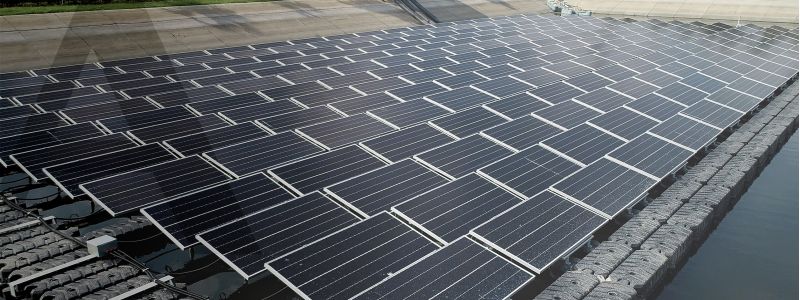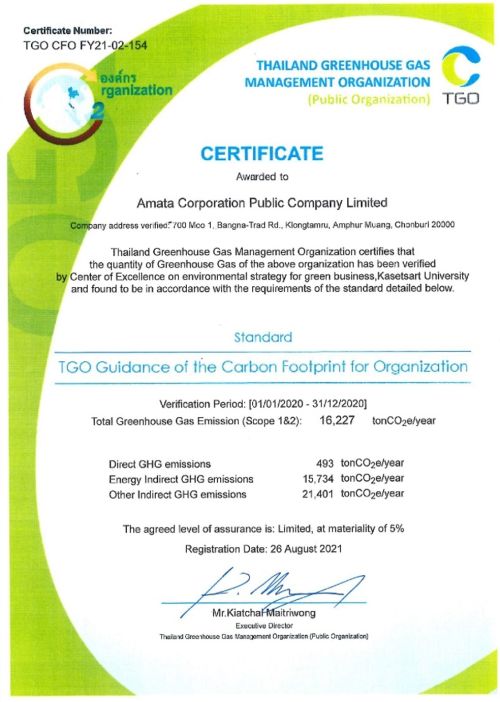Climate Resilience
Climate Resilience
Risk
Climate change is a significant challenge that leads to high risk in industrial water management as water is a major raw material for industrial estate business operations and also causes physical risks from natural disasters that are more severe each year. Climate change, therefore, has a significant impact on many stakeholders in the value chain, such as the industrial water use in the factories’ production lines and the livelihoods and well-being of the factory employees and surrounding communities. Besides this, its effect increases the Company’s operating costs on industrial water production in order to continuously supply water that meets industrial quality standards to factories in the industrial estates and on physical risk prevention against various natural disasters in the existing industrial estates and future projects.
In addition, there are currently changes in domestic and international laws and regulations relating to the climate, which pose a transition risk for the Company and factory operators in the industrial estate. As a result, the Company must prepare for the increasing climate-related demands of current and future customers, such as by preparing and disclosing its energy consumption and greenhouse gas emissions from various utilities or developing sustainable products and services to better meet the needs of customers and reduce the risk that will impact the Company’s competitiveness in the future.
Opportunity
The Company sees opportunities in developing new products and services that arise from the needs of existing factory operators in the industrial estates, who are affected by changing climate-related laws and regulations, trade standards that are influenced by government policies in each country, and increasingly stringent climate policies from their parent companies. This will enable the Company to respond to the increasing demand from new customers or target groups that place greater importance on climate change.
Management Approach
The Company is well aware of the importance of cooperation among all sectors to reduce greenhouse gas emissions. As such, it has integrated a “Climate Change Management Policy” into the determination of the Company’s goals and business plan toward a low-carbon city, which focuses on energy efficiency by 2040 and a reduction of direct and indirect greenhouse gas emission (Scope 1 and 2) intensity by 30%, compared to the 2019 base year, within 2030. The Company has launched the “Save Earth, Safe Us” campaign as well as policies and management guidelines aiming to reduce greenhouse gas emissions and cope with climate change. These consisted of three management strategies:
- Climate Resilience City
The Company places a high value on dealing with climate change from the past, such as precipitation patterns, rainfall, and the intensity of rainstorms in the eastern region that have caused drought or flooding in the past years. The Company, therefore, focuses on integrated and sustainable water management of all types, including raw water, industrial water, drought, wastewater, and flooding, to create water security, build confidence for customers and communities in the area, and reduce risks that may affect business operations and stakeholders’ quality of life.
- Strive for water security by expanding internal reservoirs
The Company has set a policy to prepare raw water reserves that are at least 150% greater than the total water demand in the industrial estates per year.
- Reduce surface water dependence by utilizing treated water based on the Zero discharge principle
The Company maximizes the reuse of treated water to reduce dependence on natural surface water sources and the risk and severity of impacts in cases of drought.
- Develop infrastructure and capabilities to handle and prevent flooding
The Company has developed infrastructure and water management systems to handle and prevent flooding, as well as raised awareness among stakeholders about the effective use of water resources and keeping public waterways clear of debris and impediments through the AMATA Water Management Learning Center and a water management community development project.
- Search for strategic locations
The Company places importance on project locations that will minimize negative impacts on factory operators and enable long-term business operations, and the results of climate change impact studies in each region are used as one of the key factors in selecting future project locations.
- Carbon Neutral City
The Company places importance on reducing greenhouse gas emissions, which are the main cause of climate change, and has established more ambitious targets towards becoming a carbon neutral city by 2040 and reducing greenhouse gas emissions by 30% by 2030 compared to the 2019 base year. This is in line with the Paris Agreement and Thailand’s goal, which was announced at the 26th session of the Conference of the Parties (COP 26) to the United Nations Framework Convention on Climate Change (UNFCCC), of reaching carbon neutrality by 2050 and net zero greenhouse gas emissions by or before 2065.
- Increase energy efficiency
The Company has replaced electrical equipment used in offices and common areas to be energy-saving devices, reduced the use of fossil fuels, and integrated this strategy into the Company’s business development plan to drive AMATA Smart City projects that focus on energy efficiency using technology and low-carbon energy sources.
- Minimize waste sent to landfills
According to the Zero Waste to Landfill target, the Company has applied principles of the circular economy to the solid waste and industrial waste management process, promoting recyclable waste sorting, maximizing the use of recyclable waste, and minimizing waste disposed to landfill.
- Accelerate the transition to renewable energy with the appropriate technology
The Company promotes increased production of renewable energy with technology that is appropriate for the Company’s operation and the area inside the industrial estate, especially the Company’s central utility system.
- Enhance ability to reduce greenhouse gas emissions through collaboration with alliances
The Company promotes research and development to reduce greenhouse gas emissions throughout the Company value chain and product life cycle. As a result, the Company concentrates on platform development as well as project design and management using Building Information Modeling (BIM) technology and the Leadership in Energy and Environmental Design (LEED) building standard.
- Climate-related Products and Services
The Company foresees an opportunity to develop new products and services based on the needs of factory operators in today's industrial estates who are affected by the enforcement of climate change laws and regulations, changes in foreign trade regulations by the government policies in each country, and more stringent climate policies from overseas head offices, as well as meeting the needs of new customers or target groups who are more concerned about climate change.
Performance
Greenhouse Gas Emission of Organization
The Company’s greenhouse gas emissions inventory was prepared annually using the Carbon Footprint for Organization (CFO) guidelines and methodologies of the Thailand Greenhouse Gas Management Organization (Public Organization) for calculating greenhouse gas emissions consist of direct greenhouse gas emissions (Scope 1), indirect greenhouse gas emissions from energy use (Scope 2), and other indirect greenhouse gas emissions (Scope 3). The scope of the report covered three locations of the Company consist of Bangkok Head Office, two offices and common area in AMATA City Chonburi Industrial Estate, and AMATA City Rayong Industrial Estate, which are under the Company’s responsibility.
In 2022, the Company’s 2021 carbon footprint of the organization (CFO) was verified and certified by Thailand’s Greenhouse Gas Management Organization (Public Organization) for the third consecutive year.
In 2021, the Company emitted 60,207 tons of carbon dioxide equivalent of total greenhouse gas, consisting of direct GHG emissions (Scope 1), 408 tons of carbon dioxide equivalent, and indirect greenhouse gas from the use of purchased electricity (Scope 2), 16,774 tons of carbon dioxide equivalent. The total direct and indirect greenhouse gas emissions (Scopes 1 and 2) were 17,182 tons of carbon dioxide equivalent (tCO2e), a 5.9% increase from the previous year but a 4.5% decrease from the 2019 base year. The combined greenhouse gas emission (Scopes 1 and 2) intensity in 2021 was 0.54 tons of carbon dioxide equivalent per rai or 3.35 tons of carbon dioxide equivalent per hectare.
According to the carbon footprint data in 2022, which was calculated using methodologies developed by the Thailand Greenhouse Gas Management Organization (Public Organization), the Company’s direct greenhouse gas emissions (Scope 1) were 443 tons of carbon dioxide equivalent, and its indirect greenhouse gas emissions were 15,370 tons of carbon dioxide equivalent from using purchased electricity (Scope 2). The total amount of direct and indirect greenhouse gas emissions (Scopes 1 and 2) were 15,813 tons of carbon dioxide equivalent (tCO2e), decreasing by 7.97% compared to 2021 and by 12.12% compared to the 2019 base year. This was the result of reducing the use of electricity purchased from outside sources, engaging in energy saving activities, and increasing the use of solar electricity in industrial estates. The greenhouse gas emissions data for 2022 is still being reviewed by the Center of Excellence in Green Business Strategy at Kasetsart University (VGREEN) and is expected to be completed by the second quarter of 2023.
The combined greenhouse gas emission (Scopes 1 and 2) intensity in 2022 was 0.49 tons of carbon dioxide equivalent per rai or 3.06 tons of carbon dioxide equivalent per hectare, decreased by 8.6% compared to 2021 and 14.0% compared to the 2019 base year.

In 2021, the Company emitted 43,025 tons of carbon dioxide equivalent from other indirect greenhouse gases emission (Scope 3). It was a 25.7% increase compared to 2020 because of changes in the calculation of greenhouse gas emissions from the contractors’ waste management activities as per the recommendations of the Thailand Greenhouse Gas Management Organization (Public Organization). In 2022, the Company emitted 42,028 tons of carbon dioxide equivalent from other indirect greenhouse gas emissions (Scope 3), which decreased by 2.3% compared to 2021. Other indirect greenhouse gas emissions (Scope 3) were attributable to the contractors’ work in various activities, as follows:

Therefore, to reduce the use of purchased electricity and other indirect greenhouse gas emissions (Scope 3), the Company encourages contractors to employ innovation and technology to reduce fossil fuel energy consumption and promote the use of renewable energy for the Company’s utility system maintenance and also strives for more recycling to reduce waste sent to landfills as much as possible.
Start
Building the Future
with AMATA

Start
Building the Future
with AMATA
Contact us for more details.
(+66) 38 939 007
(+84) 251 3991 007 (South)
(+84) 203 3567 007 (North)
(+95) 1 230 5627
(+856) 21 810007
(+856) 20 5710007 (Chinese)
(+856) 20 57550007 (English)
© AMATA CORPORATION PCL. All rights reserved. Web by Toneyes








